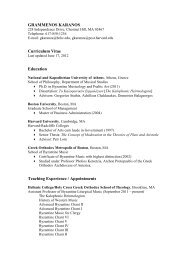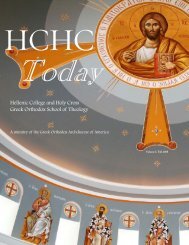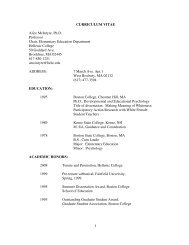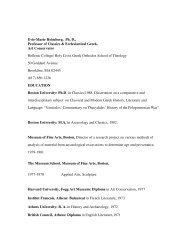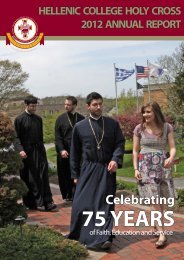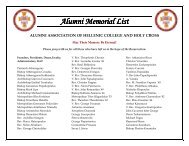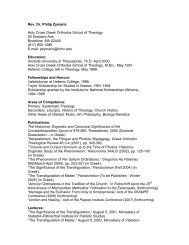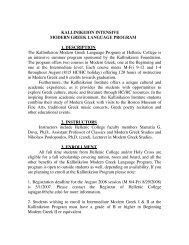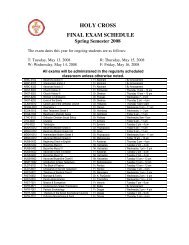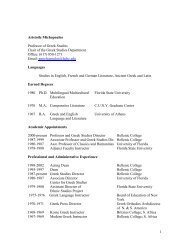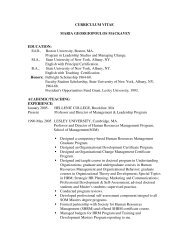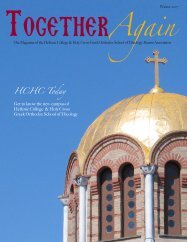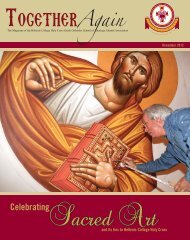Summer Academic Program May 22â June 12 ... - Hellenic College
Summer Academic Program May 22â June 12 ... - Hellenic College
Summer Academic Program May 22â June 12 ... - Hellenic College
Create successful ePaper yourself
Turn your PDF publications into a flip-book with our unique Google optimized e-Paper software.
HELLENIC COLLEGE<br />
HOLY CROSS<br />
GREEK ORTHODOX SCHOOL OF THEOLOGY<br />
<strong>Summer</strong> <strong>Academic</strong> <strong>Program</strong><br />
<strong>May</strong> 22– <strong>June</strong> <strong>12</strong>, 2013<br />
Kallinikeion Intensive Modern Greek<br />
August 5 – August 30, 2013
<strong>Summer</strong> <strong>Academic</strong><br />
<strong>Program</strong><br />
The <strong>Summer</strong> <strong>Academic</strong> <strong>Program</strong> at <strong>Hellenic</strong> <strong>College</strong> and Holy Cross offers courses at the graduate level in<br />
Greek and theology. Faculty of the School of Theology teaches all courses. Courses meet Monday through<br />
Friday, two hours a day per course.<br />
HELLENIC COLLEGE<br />
Missions Special <strong>Program</strong>: Trip to Albania (For more information please contact Rev. Luke Veronis<br />
at veronis@verizon.net.<br />
HOLY CROSS SCHOOL OF THEOLOGY<br />
FLED-6101 & FLED-6152 Hospital Ministry Dn. Markos Nickolas (3 credits)<br />
Booras Room <strong>May</strong> 20 – <strong>June</strong> 29 (Mondays 6:30 p.m. – 9:30 p.m.)<br />
Ministry to the sick and the suffering usually fulfilled during the second year of studies at area hospitals and<br />
coordinated by the course instructor.<br />
ECGK-5301 Liturgical Greek (3 credits)<br />
Dr. Evie Holmberg<br />
Room 110 (10 a.m. – <strong>12</strong> p.m.)<br />
The objective of this course is to begin a study of Liturgical Greek as a foundation for further studies in<br />
Septuagint and Patristic Greek. The students become familiar with various genres of biblical literature with a<br />
concentration in Septuagint Greek and the liturgical texts of our Church. The emphasis is on vocabulary<br />
building and the fundamentals of syntax and of new forms of poetic expression. The texts are studied within<br />
the framework of the development of the language and of the various forms of literary style extending from<br />
the third century B.C. to the fifth century A.D. The interrelation with Ancient and Modern Greek is also<br />
traced.<br />
Pre-requisite: New Testament Greek I and II<br />
OLDT-7003 Preaching the Sunday Gospels (3 credits)<br />
Rev. Dr. Eugen Pentiuc<br />
Bouras Room (9 a.m. – 11a. m.)<br />
The course is a selection of Sunday Gospel periscopes in interpretive conversation with pertinent texts from<br />
the Old Testament. The starting point of discussion is the text of the Gospel periscope. However, New<br />
Testament Greek terms and concepts will be discussed in light of Old Testament Hebrew lexicon and<br />
theology. Special attention will be given to the Semitic background of Jesus' sayings. This class is rather a<br />
workshop where instructor and students are engaged in a dynamic dialogue with the sacred text looking always<br />
at new ways this text, recording God's revelation, may be offered as a gift to a world longing after God's<br />
eternal word.<br />
OLDT-7100 Old Testament Exegesis: Hosea (3 credits)<br />
Rev. Dr. Eugen Pentiuc<br />
Bouras Room (11 a.m. – 1 p.m.)<br />
A general introduction to the study of biblical exegesis is followed by a detailed exegesis of selected passages of<br />
the Book of Hosea. Emphasis will be given to theological themes such as redemption and reconciliation found<br />
in Hosea, and the pastoral application of these themes.
*OLDT-5045 Biblical Hebrew I (3 credits)<br />
Rev. Dr. Eugen Pentiuc<br />
Bouras Room (1 p.m. – 3 p.m.)<br />
An old rabbi once said, “Reading the Bible in a translation is like kissing your bride through the veil.” Biblical<br />
Hebrew I empowers students to lift the veil and study the Old Testament in the original Hebrew. The goal of<br />
this course is to make students acquire a basic knowledge of Hebrew grammar using one of the best textbooks<br />
on the market, Thomas O. Lambdin’s, Introduction to Biblical Hebrew.<br />
*Elementary Syriac (3 credits)<br />
Rev. Dr. Eugen Pentiuc<br />
Bouras Room (1 p.m. – 3 p.m.)<br />
Students will be introduced to basic grammar and syntax.<br />
*Only one of these language classes will be offered pending enrollment.<br />
PAST-7210 The Missiology of Archbishop Anastasios of Albania<br />
Rev. Luke Veronis<br />
The course will study in depth the life, missiology and writings of archbishop Anastasios (Yannoulatos) of<br />
Albania, focusing on the foundation and calling of missions, and the practical living out of missions. We will<br />
consider the resurrection of the Church of Albania over the past 20 years, examining and analyzing the<br />
successes of how the church has succeeded in living out the missiology of the Archbishop, and where the<br />
church has not yet lived up to this missiology. We will also participate in practical missionary outreach in<br />
Albanis.<br />
For more information,please contact Rev. Luke Veronis at veronis@verizon.net.<br />
CHST-6252 Lives of the Saints (3 Credits)<br />
Dr. James Skedros<br />
Room 114 (10 a.m. – <strong>12</strong> p.m.)<br />
This course will study the genre of Early Christian and Byzantine literature known as Lives of the Saints, or<br />
commonly referred to as “Hagiography.” The student will be introduced to several different methodological<br />
approaches utilized in the study of hagiographical literature. Texts to be studied represent various literary forms and<br />
depict a wide variety of saint’s lives. Particular attention will be given to the historical, social, and religious function<br />
of the texts as well as the popular religious practices reflected in them. Attention will be given to theological themes<br />
highlighted in the texts along with Byzantine understanding of the cult of the saints.
Kallinikeion Intensive Modern Greek<br />
<strong>Summer</strong> <strong>Program</strong><br />
August 5 – August 30<br />
MDGK-<strong>12</strong>01 & MDGK-5201 Beginning Modern Greek I (6 credits)<br />
Stamatia G. Dova, Ph.D.<br />
Room 222 (9-<strong>12</strong> a.m. – 1-4 p.m.)<br />
Beginning Modern Greek I is designed for students with little or no previous instruction<br />
in Modern Greek. Our goal in this intensive class is to achieve remarkable proficiency<br />
in Modern Greek through cumulative acquisition of speaking, listening and writing skills.<br />
Instruction consists of a 3 hour per day master class studying elementary aspects of the Modern Greek<br />
language based on introductory readings (focusing on grammar and<br />
syntax as well as conversation and translation) and of a 3 hour per day language lab session practicing the<br />
newly acquired material. Students will be expected to work at least 2-3 hours per day on their own on the<br />
lesson introduced the same day and to apply themselves with enthusiasm and creativity. In return, they will<br />
become competent in conversational fluency, reading/listening comprehension and essay/sermon<br />
composition in Modern Greek.<br />
Instructor: Stamatia G. Dova, Ph.D., Assistant Professor of Classics and Modern Greek Studies at <strong>Hellenic</strong><br />
<strong>College</strong>, (617) 850-1506, sdova@hchc.edu. Office Hours: Tuesdays & Fridays 4 – 5 p.m.<br />
Textbook: (1)Greek Today: A Course In The Modern Language And Culture, by Dimitri Gondicas, John<br />
Rassias, Andromache Karanika, Chrysanthi Yiannakou-Bien, Peter Bien (Editor)<br />
(2) Greek Today Workbook by Dimitri Gondicas, John Rassias, Andromache Karanika, Chrysanthi<br />
Yiannakou-Bien, Peter Bien (Editor)<br />
MDGK-2301/23<strong>12</strong> & MDGK-6301/63<strong>12</strong> Intermediate Modern Greek I & II (6 credits)<br />
Mr. Panayotis League<br />
Booras Room (9-<strong>12</strong> a.m. – 1-4 p.m<br />
Intermediate Modern Greek is designed for students who have completed the beginning level of Modern<br />
Greek and wish to extend their knowledge beyond the intermediate level. Instruction will consist of a 3 hour<br />
per day master class studying advanced aspects of Modern Greek in grammar, syntax, conversation and<br />
translation and of a 3 hour per day lab session practicing the newly acquired material. Students will be expected<br />
to work at least 2-3 hours per day on their own on the lesson introduced the same day and to apply themselves<br />
with enthusiasm and creativity. In return, they will see (and hear) their Greek improve dramatically in<br />
conversational fluency, reading and listening comprehension as well as essay/sermon composition. This is a six<br />
credit course (20 days x 6 h/day = <strong>12</strong>0 hours of instruction.) Pre-requisite: Beginning Modern Greek II.<br />
Beginning Modern Greek 2b, or equivalent.<br />
Textbook: (1)Greek Today: A Course In The Modern Language And Culture, by Dimitri Gondicas, John<br />
Rassias, Andromache Karanika, Chrysanthi Yiannakou- Bien, Peter Bien (Editor)<br />
2) Greek Today Workbook by Dimitri Gondicas, John Rassias, Andromache Karanika, Chrysanthi<br />
Yiannakou-Bien, Peter Bien (Editor)



